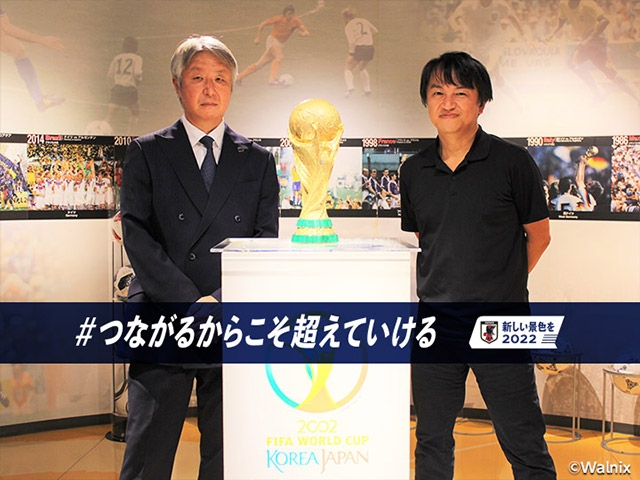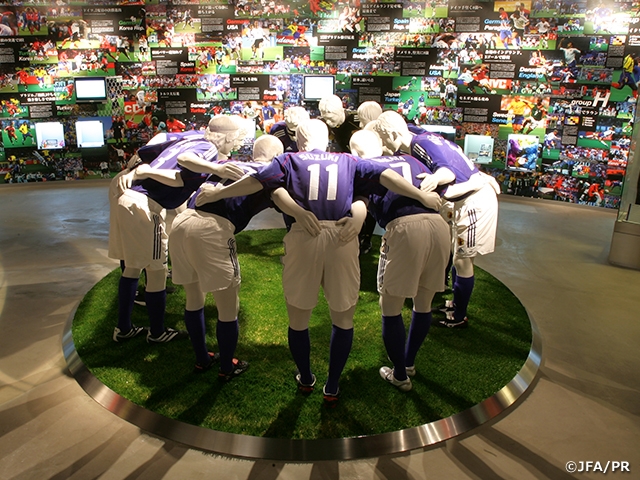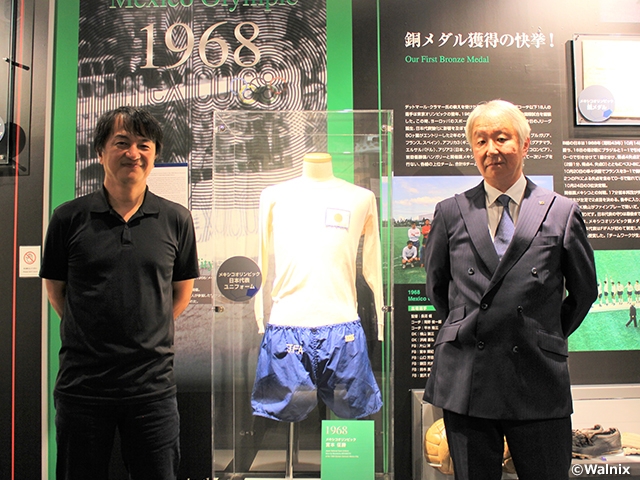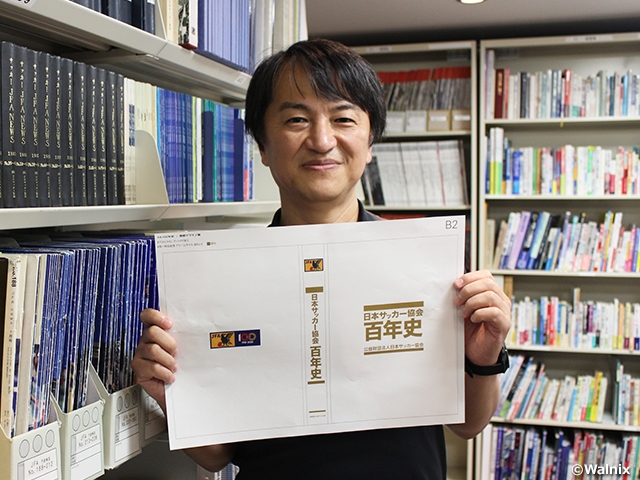NEWS
【Japan Football Museum】Interview with Mr. MURAKAMI Hiroki of JFA Administration Department Museum Group Vol.2
24 November 2022

The Japan Football Museum opened on 22 December 2003 to further develop football culture by utilising the legacy of the 2002 FIFA World Cup Korea/Japan™. Before the museum closes in February 2023, we spoke to Mr MURAKAMI Hiroki of the JFA Administration Department, Museum Group, who was involved in the establishment of the museum and is still in charge of its management and operation.
※This interview was conducted on 24 October 2022.
An indispensable platform to share the excitement
――As visitors enter the exhibition area, they are drawn to the exhibit of the Japan National Team huddled in a circle, which serves as the centrepiece of the museum.
MURAKAMI That's the 11 players who started for the Japan National Team's historic first win over Russia in the 2002 FIFA World Cup™ on 9 June 2002. In order to recreate the iconic scene, everything from the players' uniforms to their shoes are real.
――So you needed it as a device to link the past, the present, and the future?
MURAKAMI By joining the circle, it brings back the memories of those who knew about those days, and the children who were not yet born are able to connect with that historical moment (the past) and think about the future. Children, adults and the elderly, regardless of gender or nationality, can simply share the experience and connect with each other. That's what it's all about.
――Why did you decide to recreate the scene using real objects in particular?
MURAKAMI We focused on whether or not there was a story to be told with regard to each of our exhibits, and we were also particular about being realistic.

――Shoes and uniforms that were actually worn and used in the match carry a lot of weight.
MURAKAMI While we were particular about making the exhibit real, we also created videos. This exhibition area was initially a virtual stadium equipped with a three-sided mega-vision. In fact, two videos showing the entire pitch from goal to goal were shown. The World Cup Bidding Committee first proposed the idea of a virtual stadium as part of their bid proposal. It was the world's first attempt and was close to being a national project involving the Ministry of International Trade and Industry and the Ministry of Posts and Telecommunications at the time. During the 2002 FIFA World Cup Korea/Japan™, matches played in Korea Republic were screened in the main media centre at Pacifico Yokohama. It required three technologies - filming, transmission and playback - and was made possible by a high-definition satellite link and an undersea cable between Japan and Korea Republic. So, it was indeed a huge project.
――So the 2002 FIFA World Cup Korea/Japan™ was a massive event involving two nations.
MURAKAMI The Japan National Team made it to the round of 16 for the first time, and the event generated a lot of interest throughout Japan. For this reason, it made sense for the museum to start as a memorial of the 2002 FIFA World Cup Korea/Japan™ where visitors can easily experience and relive the legacy of the event.
――On the other hand, I think people's interest wanes as their memories become more distant.
MURAKAMI We knew in advance that we needed a plan for the next five to ten years. We needed a mid to long term plans for renewal. Simply displaying old items is not enough to attract visitors. What people are interested the most is the “present.” But showing that was the most difficult part.
――How can the current Japan National Team be featured in real time?
MURAKAMI Following the 2002 FIFA World Cup Korea/Japan™, there were four more FIFA World Cups: 2006 FIFA World Cup Germany™, 2010 FIFA World Cup South Africa™, 2014 FIFA World Cup Brazil™ and 2018 FIFA World Cup Russia™, which meant that there were four national teams, and an increasing amount of exhibits stocking up. How are we going to deal with it? We proposed a renewal, but it has remained on hold until now.
――The current museum will temporarily close its doors, but regardless of how it reopens, I think it will always have the same value and function in the future.
MURAKAMI It is said that football is an “industry driven by emotion.” In this context, JFA's job is to create an environment in which players can inspire people through their performances, and to pass on these inspirations to future generations in every possible way. And we think that the museum is an indispensable platform for both passing on the legacy of our predecessors in the Japanese football world and for sharing the excitement that is currently taking place around us. It is our sincere hope that it will be transformed into a more advanced facility to fulfil its pivotal role and mission.
In that regard, I am not worried because it is NAGAMATSU Futoshi (JFA Administration Department Museum Group) who will take over the work. I'm particularly impressed by his capacity to compile data from various parts of history, classify it, and organise it. I'm interested to see how he will apply this to reconstruct the museum in the future.

――What are your thoughts on this?
NAGAMATSU To be honest, I don't have anything concrete to tell you yet, but I'm wondering how we can make use of the archive function of the new museum and how we can output the data and materials we have been accumulating so far to the world. We would like to carefully consider how to do this. At the moment, the majority of the items kept in the archive are essentially being shelved there.
――Can you tell us about the direction the museum will take once it reopens?
NAGAMATSU I don't think we can centre it around the 2002 FIFA World Cup Korea/Japan™, as you might expect. Regardless of how it is expressed, I think Murakami-san’s concept of “connecting the past, present, and future” is a timeless concept that I intend to incorporate in the future. Although museums have traditionally placed a strong emphasis on realism, I think that in the future there will be a move toward digitisation. However, we do not intend to be purely unilateral. We will be looking for the best balance between analogue and digital. Nevertheless, we are just about to get started, so we hope that you will patiently keep an eye on our project.

Related News
Latest News
-
National Teams
2026/02/12
U-17 Japan National Team squad & schedule - Prayer for Peace; Hiroshima International Youth Soccer Games 2025 (2/17-23@Hiroshima)

-
National Teams
2026/02/12
Nadeshiko Japan (Japan Women's National Team) squad & schedule - AFC Women's Asian Cup™ Australia 2026 (2/23-3/22)

-
National Teams
2026/02/09
U-16 Japan Women's National Team short-listed squad & schedule - Training Camp (2/16-19@Okayama)

-
Referees
2026/02/05
JFA launches "Development Group" in refereeing Mike Riley signed as Referee Development Director

-
National Teams
2026/02/04
U-16 Japan National Team squad & schedule - 4 Nations Tournament (2/9-19@Algarve, Portugal)


